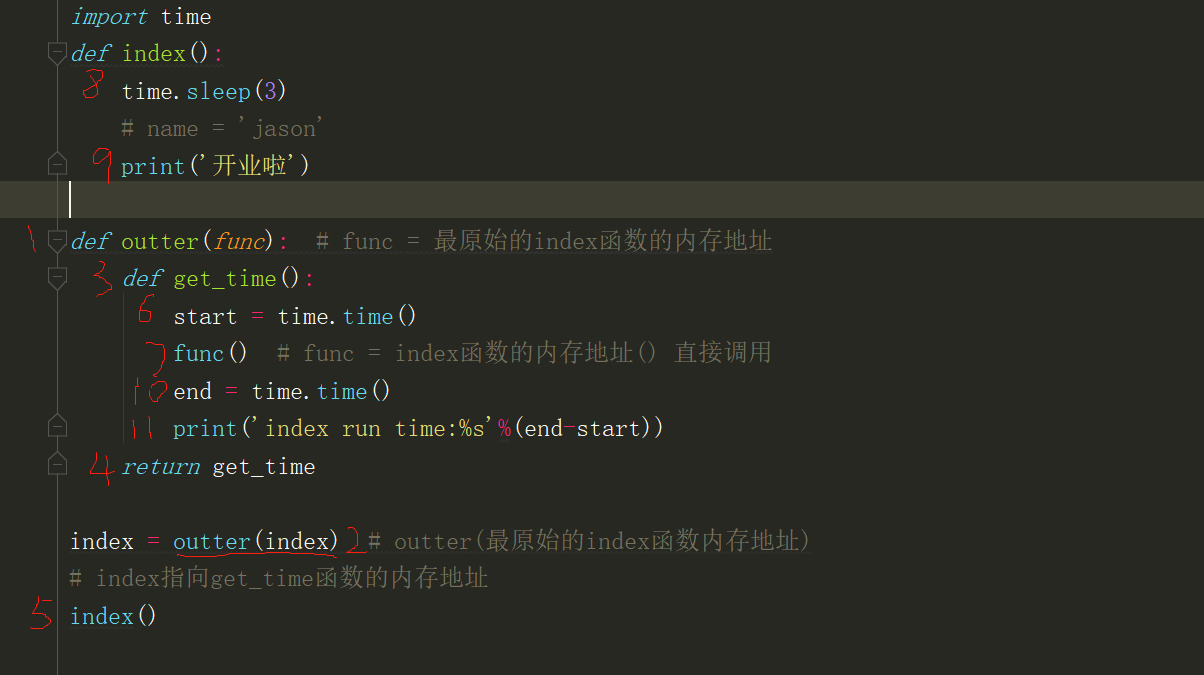Closure function
Definition of closure function:
Closed: a function defined within a function
Package: the inner function references the name of the outer function scope
There are two ways to pass values to function bodies:
1. transmitting ginseng
def index1(username):
print(username)
2. closure
def outter(x,y): #Passing parameters in a function, in res1 Call in, equivalent to x=1,y=40 # x = 1 # y = 40 def my_max(): if x > y: return x return y return my_max res1 = outter(1,40) # res Namely my_max Memory address of the function print(res1()) #If you want to stop printing 1 and 40, you can only end the program or transfer other parameters. print(res1()) print(res1()) res2 = outter(90,200) print(res2()) print(res2())
import requests def outter(url): #Pass parameters to functions in my_jd Parameter defined in to parameter # url = 'https://www.jd.com 'ා fixed reference def my_get(): response = requests.get(url) if response.status_code == 200: print(len(response.text)) return my_get my_jd = outter('https://www.jd.com') #my_jd Received is my_get Memory address of my_jd() my_jd() my_baidu = outter('https://www.baidu.com') my_baidu() my_baidu() my_baidu() my_baidu() my_baidu()
Decorator
Decorator:
Tool: it's a tool
Decoration: add new functions to the decorated objects
Why use decorators?
Open and closed principle:
Open: open to expansion
Closed: open to modification
There are two principles that decorators (callable objects) must follow:
1. Do not change the source code of the decorated object
2. Do not change the call mode of the decorated object (callable object)
First write an example of the time module
import time def index(): time.sleep(3) # Give Way CPU Sleep for 3 seconds. print('Open up') start = time.time() # Time at the beginning of program run index() end = time.time() #Time at the end of the program print('index run time:%s'%(end-start)) # Calculate the time taken by the program from start to end
How to write a time calculating decorator? Different function names can be applied
import time def index(): time.sleep(3) print('Open up') def outter(func): # func = ancestral index Memory address of the function def get_time(): start = time.time() func() # func = index Memory address of the function() Direct call end = time.time() print('index run time:%s'%(end-start)) return get_time index = outter(index) # outter(ancestral index Function memory address) # index point get_time Memory address of the function index()

How to write a decorator with and without parameters
import time def index(): #Parameter free function time.sleep(3) print('Open up') return 'index' res1 = index() def login(name): #Parametric function time.sleep(1) print('%s is s'%name) return 'login' res = login('zhangsan') def outter(func): # func = ancestral login Memory address of the function def get_time(*args, **kwargs): # write*args and**kwargs It can support both with and without parameters, and can receive any number of parameters. start = time.time() res = func(*args, **kwargs) # ancestral login Memory address of the function() Direct call func('egon') end = time.time() print('func run time:%s'%(end-start)) return res return get_time login = outter(login)
Grammatical sugar
def outter(func): # func = ancestral index Memory address of the function def get_time(*args, **kwargs): start = time.time() res = func(*args, **kwargs) # ancestral index Memory address of the function() Direct call end = time.time() print('func run time:%s'%(end-start)) return res return get_time @outter # Grammar sugar, equivalent to index = outter(index),outter It will directly pass in the function name closest to him as its own parameter. def index(): time.sleep(3) print('Open up') return 'index'
Decorator template
def outter(func): def inner(*args, **kwargs) print('What can be done before the decorated function is executed') res = func(*args, **kwargs) print('What can be done after the decorated function is executed') return res return inner
Certified decorator
Before executing the function index, you must enter the correct user name and password before executing the index. Otherwise, you will be prompted to enter an error to end the program.
import time user_dic = {'is_login':None} #Define a dictionary to store user login status def login_auth(func): # func = index def inner(*args,**kwargs): if user_dic['is_login']: # If the user is already logged in res = func(*args, **kwargs) return res #Return parameters directly else: username = input('please input your username>>>:').strip() password = input('please input your password>>>:').strip() if username == 'wu' and password == '123': user_dic['is_login'] = True res = func(*args,**kwargs) return res else: print('username or password error') return inner
Decorator supplement @ wraps
def outter(func): @wraps(func) def inner(*args, **kwargs) print('What can be done before the decorated function is executed') res = func(*args, **kwargs) print('What can be done after the decorated function is executed') return res return inner # When users view the function name of the decorated function, they will see the decorated function itself. # When users view the comments of the decorated function, they will see the comments of the decorated function.